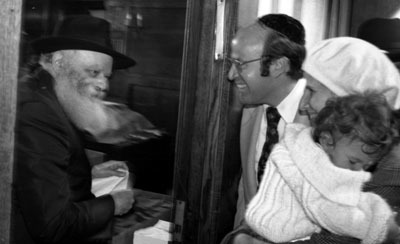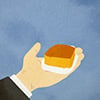Presented are images of the Rebbe, of righteous memory, distributing lekach, honey cake, on the eve of Yom Kippur.
On October 7, 1989, the Shabbat before Yom Kippur, the Rebbe discussed at length the custom of requesting and receiving lekach:
Level One

Among the reasons given for the custom of asking for a piece of lekach on the eve of the holiday of Yom Kippur is to circumvent any possible Heavenly decree that one should have to ask another for sustenance during the upcoming year. For even if such a decree had been issued, once one receives the lekach, the decree has been fulfilled... And from hereon there will be no further need to ask; all one's needs will be provided by G‑d alone.
Level Two
On a deeper level, we can take this concept even further. Since the purpose of the custom is to avoid having to receive food from a person, it is logical to say that even the lekach is not really being received from a person.
In reality, all food comes from G‑d, and therefore a poor person who receives food from another also thanks G‑d, who "provides nourishment and sustenance for all." This is because the human benefactor is only an intermediary delivering G‑d's blessings.
Nevertheless, both parties still feel that a transaction has taken place between two human beings. The poor person naturally feels some sense of shame, as evident from the fact that we all beseech G‑d in the Grace after Meals: "Please, do not make us dependent upon the gifts of mortal men." The giver also feels that he has given; and the Torah therefore must emphasize for him that he must give generously.
The giving of the lekach on the eve of Yom Kippur is different. Since these are the days when G‑d is "close," all parties involved feel that G‑d Himself is doing the giving, and the giver is no more than a messenger. Even more so, the giver is not even seen as a messenger, but just a conduit, enabling G‑d's gift to come to the beneficiary.
For this reason, the giver needs no admonition to give generously, for he does so naturally. Similarly, the recipient feels no shame, and takes the lekach not out of need, but in order to fulfill the custom.

Level Three
On a yet deeper level, one can assume that everyone has already been signed and inscribed for a good year on Rosh Hashanah. One need not take special measures to avoid a possible harsh decree; we are confident that there is no such decree.
What, then, is the purpose of taking lekach? Perhaps the explanation is that in the past year either the giver or the taker did not have the proper awareness that everything really comes from G‑d. By requesting and giving honey cake, this realization is reinforced, and the shortcoming of the past year corrected.





